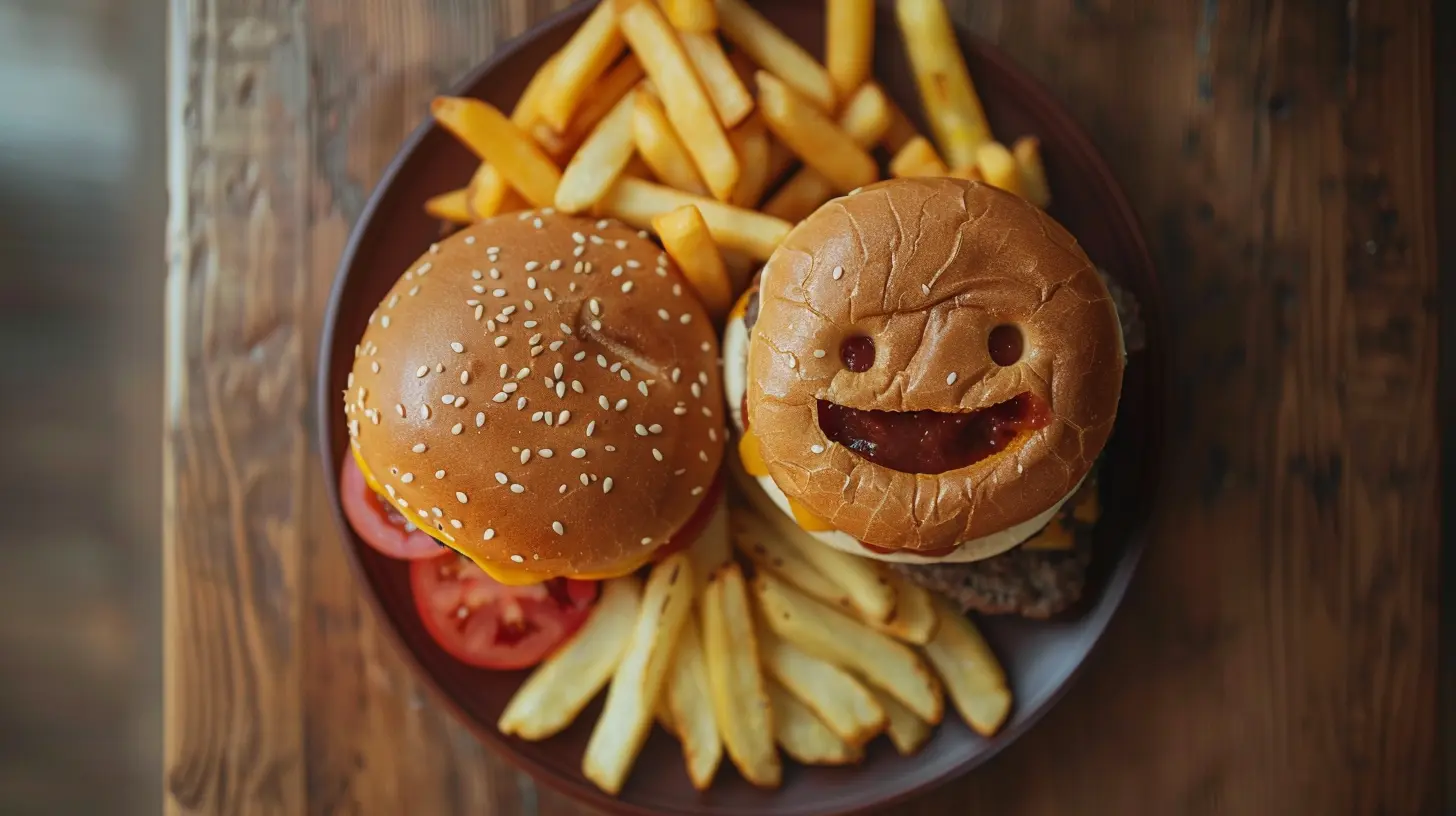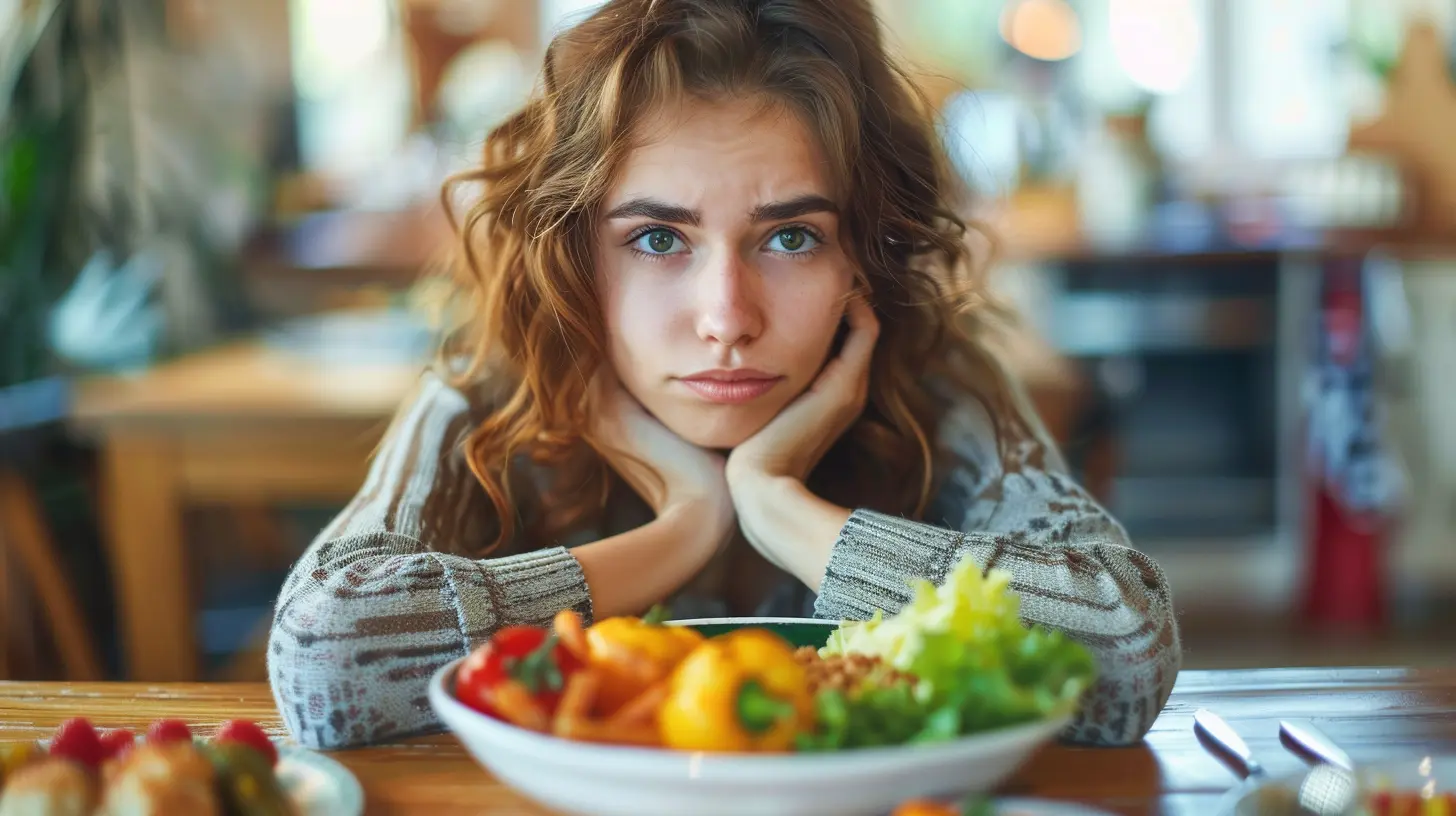Emotional Eating: Understanding the Connection Between Food and Mood
17 February 2025
Have you ever found yourself reaching for a tub of ice cream after a stressful day? Or maybe you’ve devoured an entire bag of chips while binge-watching your favorite TV show, only to wonder afterward, Why did I eat that? You’re not alone. This is what's commonly referred to as emotional eating, and it’s something many of us deal with, whether we're aware of it or not.
Emotional eating is more than just eating when you're hungry. It's using food to cope with emotions—whether it's stress, sadness, boredom, or even happiness. The tricky part is that while emotional eating can provide temporary comfort, it often leads to more problems, like guilt, weight gain, and an unhealthy relationship with food.
In this article, we’ll take a deep dive into emotional eating. We'll break down what it is, why it happens, and how you can manage it. Ready to get started? Let’s dig in!

What is Emotional Eating?
Emotional eating is when you turn to food for comfort rather than to satisfy physical hunger. It's eating in response to feelings rather than actual hunger signals from your body. We’ve all been there—grabbing a chocolate bar because you’re feeling down or stress-eating those fries after a hard day at work.It’s important to note that emotional eating isn’t inherently a bad thing. Food is, after all, tied to celebrations, comfort, and sometimes even tradition. The problem arises when emotional eating becomes a habit—when you start to rely on food as your go-to mechanism for dealing with emotions. The occasional indulgence is fine, but when food is consistently used to suppress or soothe emotions, it can become a cycle that’s hard to break.
The Science Behind Emotional Eating
Ever wonder why you reach for sugary or fatty foods when you're stressed? There’s actually a biological reason behind it. When you're stressed or anxious, your body produces higher levels of cortisol, the stress hormone. And guess what? Cortisol increases your cravings for salty, sweet, and high-fat foods. On top of that, these "comfort" foods trigger the brain to release dopamine, which makes you feel good temporarily.But here’s the kicker: this relief is short-lived. After the initial high from eating those foods, you often feel sluggish or guilty. And that guilt can lead to—you guessed it—more emotional eating. It’s a vicious cycle that can be tough to break.
Types of Emotional Eating
Not all emotional eating is created equal. In fact, there are different types, depending on the emotions driving them. Understanding the type of emotional eating you're experiencing can help you find better ways to cope.1. Stress Eating: This is probably the most common type. When life gets overwhelming, many people turn to food to deal with their stress. The act of eating—especially comfort foods—can momentarily distract you from whatever's causing the stress.
2. Boredom Eating: Ever found yourself munching on snacks just because you had nothing better to do? That’s boredom eating. You’re not hungry, but eating gives you something to do.
3. Sadness Eating: When you're feeling down, you might crave foods that give you a sense of comfort or nostalgia. Think mac and cheese, ice cream, or freshly baked cookies.
4. Reward Eating: This is when you treat yourself with food after accomplishing something. But what starts as a reward can quickly turn into a habit—you begin to associate success or happiness with food.
5. Anxiety Eating: High levels of anxiety can prompt people to eat as a way to soothe their nerves. The repetitive motion of biting and chewing can act as a calming mechanism.

Why Do We Turn to Food for Comfort?
So, why do we turn to food when emotions run high? It turns out, the answer lies deep within our biology and psychology.Food and the Brain’s Reward System
Your brain loves to be rewarded. When you eat, especially foods high in sugar or fat, your brain releases dopamine—the "feel-good" chemical. This creates a temporary sensation of pleasure and happiness. It’s no wonder that when you’re feeling down, your brain craves dopamine, and food becomes a quick and easy way to get it.This is similar to addiction. Much like how some people turn to alcohol or drugs to cope with emotions, others turn to food. And just like with substance abuse, the more you rely on food for comfort, the more you need to achieve the same emotional high.
Childhood Habits
For many people, emotional eating habits are formed in childhood. Maybe you were rewarded with sweets for good behavior, or perhaps your family celebrated every occasion with a big meal. Over time, you might have learned to associate food with love, comfort, or security. These associations can stay with you long into adulthood.Lack of Emotional Awareness
Sometimes, we don’t even realize we’re eating to cope with emotions. We might not be in touch with our feelings enough to recognize that we’re stressed, sad, or bored. Instead, we feel a vague sense of discomfort and automatically reach for food. This is especially true if you've grown up in an environment where emotions weren’t openly discussed or dealt with.
The Consequences of Emotional Eating
While emotional eating might provide short-term relief, it can lead to long-term issues if it becomes a habit.Weight Gain
One of the most obvious consequences of emotional eating is weight gain. Emotional eating often leads to overeating, especially of high-calorie, low-nutrient foods. Over time, this can result in unwanted weight gain and even obesity, which brings its own set of health risks.Guilt and Shame
After an emotional eating episode, it’s common to feel guilt or shame. You might beat yourself up for not having more self-control or feel embarrassed about your eating habits. This emotional baggage can make the problem worse, leading to more emotional eating.Disrupted Relationship with Food
When you use food as an emotional crutch, you can start to lose touch with your body’s natural hunger and fullness signals. You might eat when you’re not physically hungry or stop eating when you’re still craving more. This can make it difficult to maintain a healthy relationship with food.
How to Break the Cycle of Emotional Eating
Breaking the cycle of emotional eating isn’t easy, but it’s definitely possible. Here are some strategies to help you get started:1. Recognize Your Triggers
The first step to overcoming emotional eating is recognizing your triggers. What emotions lead you to eat? Is it stress, boredom, sadness, or something else? Keeping a food journal can help. Write down what you eat, when you eat, and how you’re feeling at the time. Over time, you’ll notice patterns.2. Find Other Ways to Cope
Once you’ve identified your triggers, the next step is finding healthier ways to cope with your emotions. Instead of turning to food, try engaging in activities that can help you manage your feelings. Some ideas include:- Exercising
- Meditating
- Journaling
- Talking to a friend
- Listening to music
- Taking a walk
3. Practice Mindful Eating
Mindful eating is all about paying attention to your body’s hunger cues. Before you eat, ask yourself, Am I actually hungry, or am I eating to cope with an emotion? If you’re not physically hungry, try to address the emotion in a different way. If you are hungry, eat slowly and savor each bite, paying attention to how your body feels.4. Don’t Deprive Yourself
Sometimes, emotional eating happens because you’ve been depriving yourself of certain foods. If you tell yourself that you can’t have any chocolate, for example, you might end up bingeing on it when your willpower runs out. Instead of cutting out foods entirely, allow yourself to enjoy them in moderation.5. Seek Professional Help
If you’re struggling to manage emotional eating on your own, don’t hesitate to seek help from a therapist or counselor. They can help you explore the underlying emotions that are driving your eating habits and provide support as you work to change them.Conclusion
Emotional eating is a common struggle, but it’s not something you have to live with forever. By recognizing your triggers, finding healthier ways to cope with your emotions, and practicing mindful eating, you can break the cycle and build a healthier relationship with food. Remember, it’s not about perfection—it’s about progress.So the next time you find yourself reaching for that bag of chips, pause and ask yourself, Am I really hungry, or am I just feeding my emotions? You might be surprised by the answer.
all images in this post were generated using AI tools
Category:
Mental Health AwarenessAuthor:

Eliana Burton
Discussion
rate this article
10 comments
Garrett Lawson
Great insights! It’s so relatable how our moods influence our cravings. Understanding this connection can really help us make healthier choices!
April 4, 2025 at 4:26 PM

Eliana Burton
Thank you! I'm glad you found it relatable—understanding this connection is key to making healthier choices!
Charlotte Lynch
Insightful read on cravings!
March 28, 2025 at 4:13 PM

Eliana Burton
Thank you! I'm glad you found it insightful!
Derek Gilbert
Fascinating topic! How do specific emotions trigger different cravings, and can awareness change our eating habits?
March 7, 2025 at 4:59 PM

Eliana Burton
Thank you! Emotions can trigger cravings by associating certain feelings with specific foods. Awareness of these emotional connections can help us make healthier choices by recognizing triggers and opting for more mindful eating habits.
Jet Forbes
This article astutely highlights how our emotions significantly influence food choices, urging a deeper understanding of emotional eating patterns.
March 1, 2025 at 3:48 AM

Eliana Burton
Thank you for your insightful comment! I'm glad you found the article's exploration of the link between emotions and food choices valuable. Understanding this connection is crucial for fostering healthier eating habits.
Solstice McCollum
Emotional eating isn't a weakness—it's a natural response to life's chaos. Acknowledge it, don’t shame it. Understanding this connection empowers us to make healthier choices and reclaim our emotions.
February 26, 2025 at 4:58 PM

Eliana Burton
Thank you for highlighting the importance of understanding emotional eating. By acknowledging our emotions and their connection to food, we can empower ourselves to make healthier choices.
Opal Castillo
This article provides valuable insights into the complex relationship between emotions and eating habits. Understanding this connection is crucial for developing healthier strategies and fostering emotional well-being. Thank you for addressing such an important topic in psychology.
February 22, 2025 at 6:01 AM

Eliana Burton
Thank you for your kind words! I'm glad you found the insights valuable. Understanding emotional eating is indeed essential for fostering healthier habits and well-being.
Kairo Kline
Thank you for shedding light on this important topic; it resonates deeply with many.
February 21, 2025 at 5:04 PM

Eliana Burton
Thank you for your kind words! I'm glad the article resonated with you.
Ashira Phillips
Fascinating topic! How do different emotions specifically influence our eating choices and habits?
February 20, 2025 at 5:16 PM

Eliana Burton
Thank you! Emotions can significantly influence our eating habits—stress may lead to comfort eating, while happiness might encourage healthier choices. Understanding these connections can help us develop better eating behaviors.
Christa Stone
Thank you for this insightful article on emotional eating. It truly resonated with me, as I often find myself reaching for comfort foods during tough times. Understanding the connection between our emotions and eating habits is essential for fostering healthier relationships with both food and ourselves.
February 20, 2025 at 4:30 AM

Eliana Burton
Thank you for your thoughtful comment! I'm glad the article resonated with you and helped illuminate the important link between emotions and eating.
Trevor McPherson
This article insightfully explores the complex relationship between food and emotions. It highlights how understanding emotional eating can empower individuals to make healthier choices and improve their overall well-being, fostering a more balanced approach to nutrition and self-care.
February 18, 2025 at 4:23 AM

Eliana Burton
Thank you for your thoughtful feedback! I'm glad you found the article useful in understanding the link between food and emotions.
MORE POSTS

How to Manage Stress in High-Pressure Situations

Coping Mechanisms: What Are They, and How Do They Work?

The Psychology of Creativity: Unleashing Your Inner Genius

How to Honor a Loved One's Memory While Moving Forward

Body Dysmorphia: Understanding the Mental Struggles Beyond the Mirror

How to Build Emotional Endurance in the Face of Failure

How Grief Affects Relationships: Navigating Loss Together